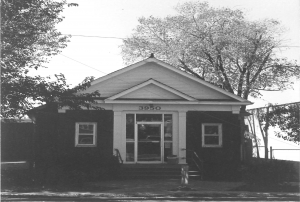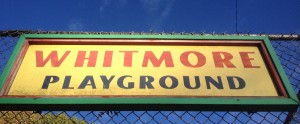 In 1957, the Kansas City Mennonite Church was organized in upper Rosedale. The Western District Conference purchased a building across from the University of Kansas Hospital and Stanley Bohn was installed as pastor in August 1957. On November 24th of the same year, the church celebrated its Charter Day with 45 members and their children. Family names included: Claasen, Goering, Moeller, Heidebrecht, Goertz, Neufeld, Penner, Wedel, and Gaeddert.
In 1957, the Kansas City Mennonite Church was organized in upper Rosedale. The Western District Conference purchased a building across from the University of Kansas Hospital and Stanley Bohn was installed as pastor in August 1957. On November 24th of the same year, the church celebrated its Charter Day with 45 members and their children. Family names included: Claasen, Goering, Moeller, Heidebrecht, Goertz, Neufeld, Penner, Wedel, and Gaeddert.
In 1964, Grace Mennonite Church from Mission, Kansas merged with the Kansas City Mennonite Church to become one of the first dual-membership churches. The name adopted by the merged congregation was Rainbow Boulevard Mennonite Church.
Beginning in 1963, the ministers of five churches in Rosedale began meeting to consider more effective ways of being in Christian mission in the rapidly changing community. Spirited by community-minded ministers, these conversations led the congregations of the Rosedale Christian Church, Rosedale United Methodist Church and Rainbow Boulevard Mennonite Church to form Rosedale Team Ministry, an effort to increase their impact within the community. This group shortly thereafter established Cross-Lines Cooperative Council.
Working together in the community, the three churches became well acquainted. By the late 1960s, Rainbow found itself needing a new meeting place. With a membership of 150, even with two worship services offered, it was standing room only.
In 1969, when Rainbow began looking for larger quarters to accommodate growth, the United Methodist church invited them to consider sharing their building. After much consideration, a two-year trial period began in December of 1969 with separate worship services and a joint church school. They were joined a year later by the Disciples. When Rainbow moved to its current location, the congregation dropped “Boulevard” from its name, and became, “Rainbow Mennonite Church.”
The three churches shared together in fellowship, financial resources and mission. Joint community programs flourished in the following years as the three ministers worked together with able assistance from community development staff and volunteers.
Early involvement in the civil rights and anti-Vietnam War movements influenced the church’s early development and subsequent history. The multiple uses of the church building reveal the continuing mission of the church. Many programs focused on aiding the health of the community.
Services were offered in several locations. The former Rainbow building, known as Common Ground, provided a facility for young adult ministries, an alternative school, a Gift and Thrift, a hospitality room and lodging. The former Disciples’ building housed, such things as a girls’ club, Team ministries, VISTA program, education services and other day-to-day activities related to community development. Legal services, Building Blocks, Whitmore Playground, neighborhood repair and restoration project, a tool bank, a boys’ club, Open Market and Mennonite Voluntary Service Unit Programs were located nearby. The main “Methodist” building was home to the nutrition site, food bank, Head Start, joint vacation Bible school, financial assistance, support for community organizations and related services.
The three congregations, community people and various agencies shared responsibility for services provided; thus the identity: Sharing Community in Rosedale. In 1977, a not-for-profit corporation with this name was officially created. This cooperative arrangement provided a structure for working together without detracting from the unique points of each denomination.
The church’s impact on the local Rosedale community is intimately tied to its relationship with the Sharing Community in Rosedale. The formation of SCR enabled the three congregations to jointly acquire The Whitmore property directly across the street from the church building and transform it into a neighborhood park, replete with play equipment for different age groups, basketball courts, and two small fields. The playground has become a year around recreational resource for lower Rosedale. Whitmore Playground was the start of many other neighborhood improvements and a joyful reminder that a community can help create its own future.
In 1991 it became necessary for the United Methodist and Disciples congregations to join Rainbow for worship services year-round. Frank Ward was the full-time pastor for all. Closeness developed over the years causing the congregations to be more tolerant and adapt practices. For example: the Disciples were accustomed to receiving communion every Sunday and the Mennonites 4-5 times a year. Now, communion is offered once a month.
After various programs ran their courses, the original church buildings owned by the Mennonite and Disciples congregations were sold and the proceeds made available to the work of the Sharing Community in Rosedale. The United Methodist congregation disbanded and transferred ownership of the church building and the parsonage to the Sharing Community.
Our church started its life as a mission church in Kansas City, Kansas and has thrived. We continue to celebrate the efforts and accomplishments of this congregation and its many years of history.
